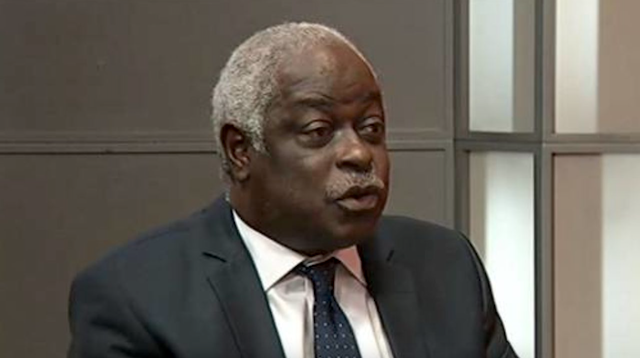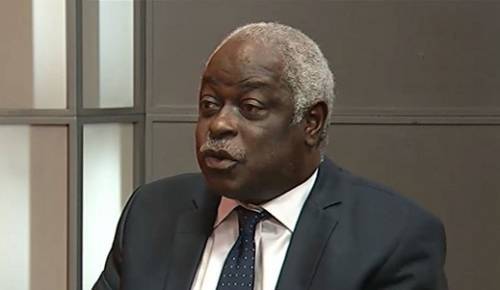“God is behind the devaluation of the Naira”.
The internet has spawned a panoply of conspiracy theories. We have a handful here in Nigeria. Buhari died a long time ago. The man in Aso Rock for years was not Buhari. Some people conspired to steal the 2023 election. There is a secret cabal ruling this country.
But the word of God says we should not call a conspiracy what men call a conspiracy. (Isaiah 8:12-13). According to the scriptures, there is no conspiracy in life. There is no conspiracy in the world. There is only one Conspirator, and it is God. He is the one behind everything. He is behind the good, the bad, and the ugly. Therefore, fear Him and Him alone.
He is the One who causes men to stumble. He is the Rock of Offence against Whom they hit their cars. He is the One who makes foolish men think they can plan to rob a bank and get away with it. He is the One who makes them rig the election and they think they succeed when they are declared the winners.
He is the One:
“Who foils the signs of false prophets and makes fools of diviners, who overthrows the learning of the wise and turns it into nonsense.” (Isaiah 44:25).
“Have you not known? Have you not heard? Has it not been told you from the beginning? Have you not understood from the foundations of the earth? It is He who sits above the circle of the Earth, and its inhabitants are like grasshoppers, who stretches out the heavens like a curtain, and spreads them out like a tent to dwell in. He brings the princes to nothing; He makes the judges of the earth useless. (Isaiah 40:21-23).
Questions and questions
While driving on a bridge in Lagos, I asked God a question. When I looked up, the answer was boldly written on a billboard. It had always been there, with its words as dead letters, waiting for me to pass by. But God gave life to those dead letters and used them to answer my question precisely when I asked Him.
Now here is the challenge. How come the very instance I asked the question was the same instance I was at the billboard? Did I ask the question, or did God make me ask it? Did I look up at the billboard when I got near it, or did God make me look up?
Who put up the billboard? Did someone put it up or did God put it up? Was it put up specifically for me, waiting to answer my question? Now that it has been used to answer my question, is the billboard still useful? Will God use it to answer other questions from other people?
Let me tell you what I have learnt at the feet of the Lord.
Everything, without exception, is the work of God. God put up the billboard. God wrote the letters on the billboard. God made me pass by the billboard. God made me ask my question when I got to the billboard. God made me look up when I got to the billboard. God caused the billboard to answer my question.
God is the uncaused Cause of everything. One hundred per cent.
God says:
“I am the Alpha and the Omega, the First and the Last, the Beginning and the End. (Revelation 22:13).
God orchestrates all things. He determines all things. He controls all things, including every human being.
God is God
God is God over everything. He decrees everything. He is the Alpha and the Omega of everything. (Revelation 1:8).
Charles Spurgeon says: “I believe that every particle of dust that dances in the sunbeam does not move an atom more or less than God wishes. The fall of leaves from a poplar is as fully ordained as the tumbling of an avalanche.”
God says:
“I am God, and there is no other; I am God, and there is none like Me, declaring the end from the beginning, and from ancient times things that are not yet done, saying, ‘My counsel shall stand, and I will do all My pleasure.’” (Isaiah 46:9-10).
God is not mentioned even once in the Book of Esther. Nevertheless, God is the One that manipulates everything from the ending to the beginning.
Take a look at this scripture:
“Boaz took Ruth, and she became his wife; and when he went in to her, the Lord gave her conception, and she bore a son.” (Ruth 4:13).
She did not have a child. God gave her a child. God gave her conception.
The Bible testifies that fishes obey God. (Jonah 1:17). Worms obey God. (Jonah 4:7). God shuts the mouths of lions. (Daniel 6:21). Snakes become harmless at God’s command. (Isaiah 11:8). Lice, flies, and locusts obey God, as they did in Pharaoh’s Egypt. (Exodus 10:13). The wind and the seas obey God. (Mark 4:39).
God commands and raises the stormy wind, which lifts the waves of the sea. (Psalm 107:25). Fire and hail, snow and ice, hurricanes obey His orders. (Psalm 148:8). He calls for a famine in the land; He destroys all the provision of bread. (Psalm 105:16). He calls for a drought on the land and the mountains, on the grain and the new wine and the oil, on whatever the ground brings forth, on men and livestock. (Haggai 1:11).
He declares:
“I make peace and create calamity; I, the Lord, do all these things.” (Isaiah 45:7).
God was the cause of all the calamity that befell Job:
“All his brothers, all his sisters, and all those who had been his acquaintances before, came to him and ate food with him in his house; and they consoled him and comforted him for all the adversity that the Lord had brought upon him.” (Job 42:11).
God is behind the devaluation of the naira. He is the One who caused the price of petrol and diesel to skyrocket. He is the one responsible for the high inflation rate. When your pencil falls to the ground, it is God.
Solomon says:
“We may throw the dice, but the Lord determines how they fall.” (Proverbs 16:33).
Jesus says:
“Aren’t two sparrows sold for a penny? Not one of them will fall to the ground without your Father’s permission. Every hair on your head has been counted.” (Matthew 10:29-31).
The Scriptures tell us God works:
“By the power that enables Him to bring everything under His control.” (Philippians 3:21).
“(He) works all things according to the counsel of His will.” (Ephesians 1:11).
Men only do:
“Whatever (God’s) hand and (God’s) purpose determined before to be done.” (Acts 4:28).
“A man’s heart plans his way, but the LORD directs his steps.” (Proverbs 16:9).
We do not even understand why we do the things we do. Only God knows. (Proverbs 20:24).
God says:
“My purpose will stand, and I will do all that I please.” (Isaiah 46:10).
God’s sovereignty
David acknowledges to God a fundamental truth about God and all mankind known to, and accepted by, only a few men:
“My times are in (God’s) hands. (Psalm 31:15).
He notes furthermore that God programs beforehand every minute detail of the lives of every man:
“You saw me before I was born. Every day of my life was recorded in Your book. Every moment was laid out before a single day had passed.” (Psalm 139:16).
God creates every man for a specific purpose in the counsel of God, to play a specific role in life. There is a purpose that God has purposed in your life. It is a purpose only you can fulfil.
The righteous are:
“A chosen generation, a royal priesthood, a holy nation, (God’s) own special people, that (they) may proclaim the praises of Him who called (them) out of darkness into His marvelous light.” (1 Peter 2:9).
But the wicked are made for the day of doom. (Proverbs 16:4).
“The wicked are estranged from the womb; they go astray as soon as they are born, speaking lies.” (Psalm 58:3).
Knowledge and understanding
It is God who gives knowledge, wisdom, and understanding. (Proverbs 2:6). Elihu says:
“There is a spirit in man, and the breath of the Almighty gives him understanding.” (Job 32:8).
If God wants us to know something, He will ensure we know it. Thus, Luke says of Lydia:
“The Lord opened her heart to heed the things spoken by Paul.” (Acts 16:14).
But if God does not want us to know something, He will ensure that we will not know it. This was the predicament of biblical Israel:
“God has given them a spirit of stupor, eyes that they should not see and ears that they should not hear, to this very day.” (Romans 11:7).
If a man’s ways are pleasing to the Lord:
“He makes even his enemies to be at peace with him.” (Proverbs 16:7).
But if we offend God, He ensures that our enemies prevail against us.
The psalmist recognises this. He says to God:
“You make us turn back from the enemy, and those who hate us have taken spoil for themselves.” (Psalm 44:10).
CONTINUED

